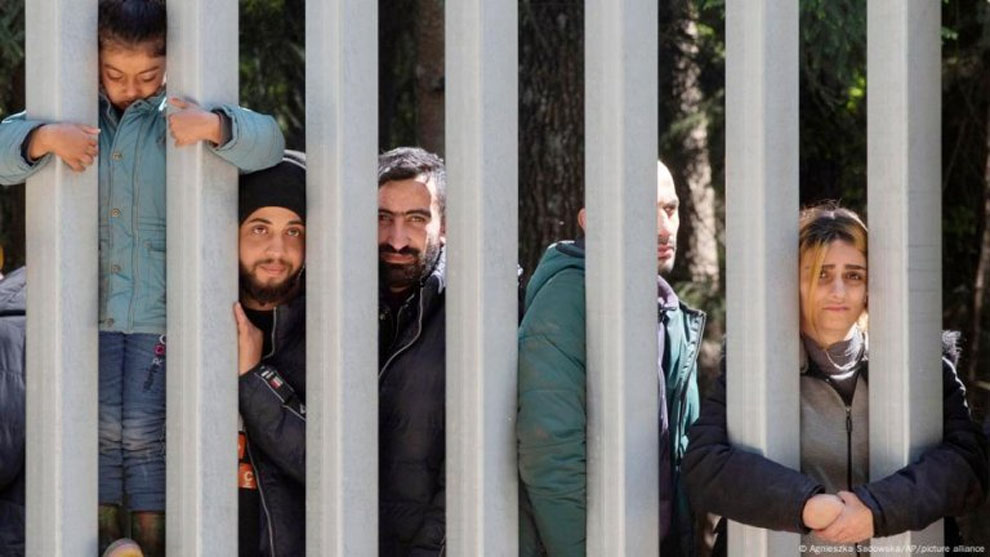International
Explosion rocks Gaza, Israel intercepts rocket as truce ‘expires’

Explosion rocks Gaza, Israel intercepts rocket as truce ‘expires’
Israel’s military said it intercepted a rocket fired from Gaza early on Friday while Hamas-affiliated media reported sounds of gunfire and explosions in the north of the coastal strip shortly before a deadline to extend a seven-day truce was set to expire.
Air raid sirens sounded in Israeli communities near the border with Gaza as the 7 a.m. (0500 GMT) deadline to extend the pause in fighting neared.
Israel’s Kan public broadcaster described the sirens as the first to sound since the truce, which has been extended twice, began on Nov. 24. Neither side has announced an extension to the truce.
There was no immediate comment from Hamas or claim of responsibility for the launch. Israel’s military said its Iron Dome missile defence system had intercepted the projectile.
The Shehab News Agency, which is considered close to Hamas, reported explosions and gunfire could be head in the northern part of the Gaza Strip. Other Hamas-affiliated media reported sounds of military and drone aircraft flying over Gaza City. No other details were immediately available.
After two last-minute extensions, the enemies marked the seventh day of a Qatari-mediated truce on Thursday with the exchange of eight hostages and 30 Palestinian prisoners as well as the infusion of more humanitarian aid into the shattered Gaza Strip.
Mark Regev, an adviser to Israeli Prime Minister Benjamin Netanyahu, said Israel was open to continuing the ceasefire if Hamas committed to further hostage releases. Israel had previously set the release of 10 hostages a day as the minimum it would accept to pause its assault.
“We’re ready for all possibilities…. Without that, we’re going back to the combat,” he said on CNN.
READ ALSO:
- How Visa flagged Naira Marley’s credit card for fraud – Witness tells court
- Police neutralise over 50 bandits in Taraba
- Ruthless Super Falcons dispatch Cape Verde 5-0 in women’s AFCON qualifier
Before the prior truce was due to expire early on Thursday, Hamas and its ally, the armed wing of Palestinian Islamic Jihad, put their fighters on alert for a resumption of hostilities.
Israel has sworn to annihilate Hamas, which rules Gaza, in response to the Oct. 7 rampage by the militant group, when Israel says gunmen killed 1,200 people and took 240 hostages.
Israel retaliated with intense bombardment and a ground invasion. Palestinian health authorities deemed reliable by the United Nations say more than 15,000 Gazans have been confirmed killed.
BROTHER, SISTER TEENS RELEASED
With fewer Israeli women and children left in captivity, lengthening the truce could require setting new terms for Hamas to release Israeli men, including soldiers.
The militant group could in turn seek to have Palestinian male prisoners handed over. So far, three Palestinian prisoners have been freed for each Israeli hostage.
A view shows the damaged buildings of Northern Gaza strip, as seen from the viewpoint in Sderot
One of Qatar’s lead negotiators, diplomat Abdullah Al Sulaiti, who helped broker the truce through marathon shuttle negotiations, acknowledged in a recent Reuters interview the uncertain odds of keeping the guns silent.
“At the beginning I thought achieving an agreement would be the most difficult step,” he said in an article that detailed the behind-the-scenes efforts for the first time. “I’ve discovered that sustaining the agreement itself is equally challenging.”
Thursday’s releases brought the totals freed during the truce to 105 hostages and 240 Palestinian prisoners.
Among the newly released were six women aged 21 to 40 including one Mexican-Israeli dual national and 21-year-old Mia Schem, who holds both French and Israeli citizenship.
Photos released by the Israeli prime minister’s office showed Schem, who was captured by Hamas along with others at an outdoor music festival in southern Israel on Oct. 7, embracing her mother and brother after they were reunited at the Hatzerim military base in Israel.
READ ALSO:
- FG to begin payment of new minimum wage in April
- Sarkin Fulani, 2 others sentenced to life imprisonment
- No former governor is exempted from our investigation – EFCC
The other two newly released hostages were a brother and sister, Belal and Aisha al-Ziadna, aged 18 and 17 respectively, according to the Israeli prime minister’s office. They are Bedouin Arab citizens of Israel and among four members of their family taken hostage while they were milking cows on a farm.
ISRAEL AGREES TO PROTECT CIVILIANS, BLINKEN SAYS
The truce has allowed some humanitarian aid into Gaza after much of the coastal territory of 2.3 million people was reduced to wasteland in the Israeli assault.
More fuel and 56 trucks of humanitarian supplies entered Gaza on Thursday, Israel’s defence ministry and the Palestinian Red Crescent Society said.
But deliveries of food, water, medical supplies and fuel remain far below what is needed, aid workers say.
At an emergency meeting in Amman, Jordan’s King Abdullah on Thursday urged U.N. officials and international groups to pressure Israel to allow more aid into the beleaguered enclave, according to delegates.
U.S. Secretary of State Antony Blinken, in Israel during his third visit to the Middle East since the war began, agreed that the flow of aid into Gaza was not sufficient.
Blinken said he told Netanyahu that Israel cannot repeat in south Gaza the massive civilian casualties and displacement of residents it inflicted in the north.
“We discussed the details of Israel’s ongoing planning and I underscored the imperative for the United States that the massive loss of civilian life and displacement of the scale that we saw in northern Gaza not be repeated in the south,” Blinken told reporters in Tel Aviv.
“And the Israeli Government agreed with that approach,” he said. This would include concrete measures to avoid damaging critical infrastructure such as hospitals and water facilities and clearly designating safe zones, he said.
Explosion rocks Gaza, Israel intercepts rocket as truce ‘expires’
(REUTERS)
International
$100m coin collection buried for decades to be auctioned

$100m coin collection buried for decades to be auctioned
A coin collection, much of which remained buried underground for over 50 years, is expected to surpass $100 million at auction, according to experts.
Named the Traveller Collection, this extraordinary assemblage is believed to be the most valuable coin collection ever brought to auction.
The coins will be sold gradually over the next three years, with the first auction set for May 20.
Beyond its immense value, the collection’s origins make for a fascinating tale.
Spanning over 100 territories and encompassing coins from ancient times to the modern era, the collection is being auctioned by Numismatica Ars Classica.
What sets it apart is that most of the coins remained hidden underground for half a century before resurfacing.
According to a press release shared with CNN, the anonymous collector behind the collection began acquiring gold coins after the Wall Street Crash of 1929.
Over time, he developed “a taste for coins with great historical interest, beauty and rarity” and eventually amassed approximately 15,000 coins.
During the 1930s, he and his wife traveled extensively across the Americas and Europe, acquiring rare and historically significant coins while meticulously documenting their purchases.
READ ALSO:
- EFCC re-arraigns son of ex-PDP chairman for alleged N2.2bn oil subsidy fraud
- Group says Natasha’s recall will deepen democracy
- We welcome Gov Makinde’s U-turn on Shari’ah panel – MURIC
Despite settling in Europe at a time when Hitler’s Nazi party loomed over the continent, the collector sensed the impending danger. In response, he carefully packed the coins into cigar boxes, which were then placed inside aluminum containers and buried underground, where they remained undisturbed for five decades.
Among the collection is a 50 Toman coin, part of an “exceedingly rare” set minted in Tehran and Isfahan during the late 18th and early 19th centuries.
International
AI will replace doctors, teachers, others in 10 years – Bill Gates

AI will replace doctors, teachers, others in 10 years – Bill Gates
Bill Gates, a co-founder of Microsoft, has claimed that improvements in artificial intelligence (AI) over the next decade may render humans superfluous for the majority of work.
In a recent interview with comedian Jimmy Fallon on NBC’s The Tonight Show in February, the billionaire philanthropist discussed how AI may take over many facets of life and business.
Gates remarked that expertise is currently “rare”, emphasising the continuous reliance on human specialists in industries such as medicine and education.
For example, we continue to rely on highly trained individuals, such as “a great doctor” or “a great teacher”, whose knowledge cannot be simply replaced by AI.
However, “with AI, over the next decade, that will become free, commonplace — great medical advice, great tutoring,” Gates said.
READ ALSO:
- Senate seeks FG’s immediate intervention to slash data prices
- Reno Omokri: Nigeria gives more opportunities than US, Britain, Canada
- Driver remanded for causing Osun varsity students’ death
In other words, Gates believes that the world is entering a new era of “free intelligence”, as he described in a recent interview with Harvard University professor and happiness specialist Arthur Brooks.
According to Gates, this transition will result in rapid breakthroughs in AI-powered technology, making them more accessible and affecting almost every part of our lives.
These breakthroughs will vary from more effective treatments and diagnoses to widely available AI instructors and virtual assistants.
“It’s very profound and even a little bit scary — because it’s happening very quickly, and there is no upper bound,” Gates told Brooks.
The discussion of how humans will fit into an AI-powered future continues.
Some analysts suggest that artificial intelligence will improve human productivity rather than completely replacing labour, hence driving economic growth and creating new jobs.
However, Microsoft AI CEO Mustafa Suleyman cautions that technological improvements in the coming years will disrupt the nature of most occupations across nearly all industries, potentially exerting a “hugely destabilising” influence on the workforce.
AI will replace doctors, teachers, others in 10 years – Bill Gates
International
Poland suspends migrants’ right to apply for asylum

Poland suspends migrants’ right to apply for asylum
Poland has temporarily suspended the right of migrants arriving in Poland via its border with Belarus to apply for asylum.
Prime Minister Donald Tusk announced it would be happening after the controversial bill, which will allow Polish authorities to suspend this right for up to 60 days at a time, was signed into law by President Andrzej Duda.
Tusk had said it would be adopted “without a moment’s delay” while Duda said the changes were needed to strengthen security on the country’s borders.
But the law has been criticized by rights groups including Human Rights Watch, which said the EU should take legal action against Poland if it was implemented.
The group urged the country’s parliament last month to reject the bill, saying it “flies in the face of Poland’s international and EU obligations” and could “effectively completely seal off the Poland-Belarus border, where Polish authorities already engage in unlawful and abusive pushbacks”.
READ ALSO:
- Trump slaps 25% tariffs on car imports to US
- Reps pass bill to strip Vice President, governors, deputies of immunity
- Businessman collapses in court during trial over $578,000 cash seizure
The government said previously the suspension would only be applied temporarily to people who pose a threat to state security, for example large groups of aggressive migrants trying to storm the border.
Exemptions will be made for unaccompanied minors, pregnant women, the elderly or unwell, anyone exposed to “real risk of serious harm” by being returned and citizens of countries accused of conducting the instrumentalization of migration – like Belarus
Tusk has dismissed criticism from human rights groups.
“Nobody is talking about violating human rights, the right to asylum, we are talking about not granting applications to people who illegally cross the border in groups organised by Lukashenko,” he said in October.
Since 2021, Poland, Lithuania, Latvia and Finland have seen a huge increase in the number of people crossing into their countries illegally from Belarus and Russia.
Polish authorities have sent thousands of troops and border guards to police its border with Belarus and built a 5.5-metre-high steel fence along 186 km of the frontier where at times several thousand migrants have been left stranded.
Rights groups estimate more than one hundred people have died on the borders between Belarus and Poland, Lithuania and Latvia since 2021.
EU eastern flank countries and the European Commission have accused the Belarusian and Russian authorities of weaponising migration to create a new route into the EU to destabilize the bloc.
Poland suspends migrants’ right to apply for asylum
BBC
-

 metro2 days ago
metro2 days agoRivers administrator Ibas fires Fubara’s political appointees
-

 metro2 days ago
metro2 days agoJUST-IN: Ex-Oyo gov Ajimobi’s first child Bisola dies At 42
-

 International3 days ago
International3 days agoCanada removes bonus ranking points for job offers in Express Entry system
-

 metro2 days ago
metro2 days agoHow ritualists, native doctor drugged, murdered underage sisters in PH – Police
-

 metro2 days ago
metro2 days agoFG declares public holidays for Eid-el-Fitr
-

 Sports3 days ago
Sports3 days agoNigeria’s Super Eagles falter in W’Cup qualifiers against Zimbabwe, S’Africa lead, Egypt, Morocco qualify
-

 metro3 days ago
metro3 days agoAkpabio has habit of abusing women, says Atiku
-

 Africa2 days ago
Africa2 days agoNiger coup leader sworn in as president for five years













